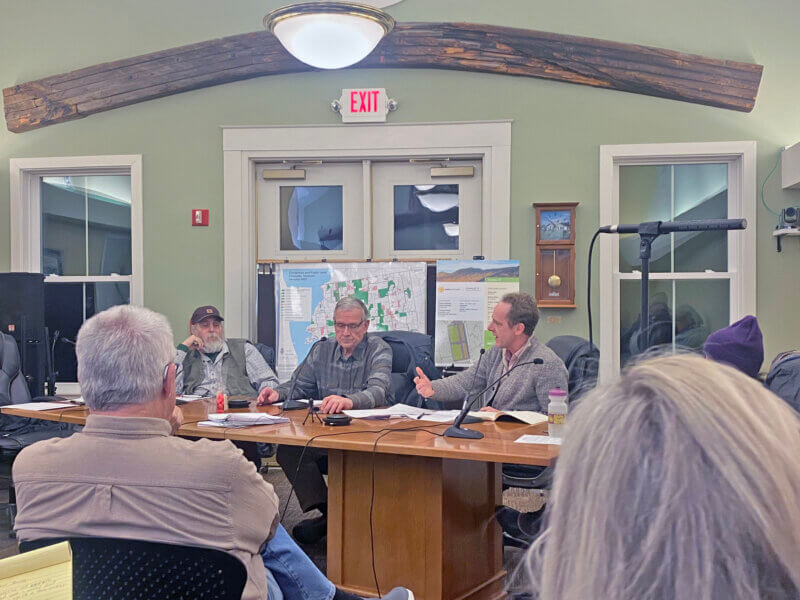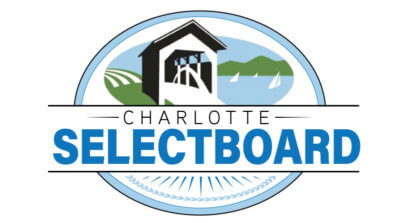Two very different hearings on town manager
What if a town held a hearing and nothing was heard?
This rhetorical question was close to reality Tuesday, Jan. 30, when the Charlotte Selectboard held a hearing where it attempted to restrict comments from audience members who support changing the municipal government from a town administrator to a town manager.
It was a totally different story at another official hearing six days later this Monday, Feb. 5, about the issue. The board apologized for its actions at the previous meeting. The discussion was open and included people speaking on both sides of the issue with no constraints on how long they talked or what they said.
The meeting on Jan. 30 began with selectboard chair Jim Faulkner saying that people could ask questions and, if the board didn’t know the answers, supporters of the town-manager switch might be able to answer them.

A big crowd turned out in person and online for this Monday’s hearing at town hall about whether Charlotte should adopt the town manager form of municipal government.
But board member Kelly Devine interrupted to make a point of order, asserting that only elected officials should be allowed to speak because if others spoke it could be perceived as bias. She said, if questions came up that the selectboard couldn’t answer, the board could do some research or check with the town attorney.
During the meeting, board members said they didn’t know the answer to many of the questions asked, even though most of those questions had been answered by a study the town paid Lee Krohn, retired Shelburne town manager, to do this summer.
A couple of people close to town government said some members of the selectboard talked with the town attorney after this hearing, and he reportedly admonished them for the way the meeting was conducted.
“I do not support the move to a town manager,” said board member Lewis Mudge by phone after the meeting. He did not attend the meeting because of family responsibilities. “But, if we win this vote, and we stay with a town administrator, I don’t want it to be because we didn’t enable people to speak their minds.”
At a previous meeting some months ago, the board took a straw poll about the switch and all of them said they opposed it, although Devine said after this first hearing that she had just voted against holding the vote, not against the switch.
After a question from Lisa Kiley about what authority a town manager would have, Devine said the board didn’t know because the proposed change to a town manager came from a petition rather than from the selectboard.
“Every single town has its own version of this kind of language,” Devine said.
Lane Morrison, one of those who developed the petition, said he would like to speak to correct what Devine had said.
Frank Tenney said the format of the meeting was to just hear questions. Faulkner and Devine responded that the meeting was not supposed to be a debate.
“What you just said was not correct, so it misleads the audience and the voters,” Morrison said.
If passed, that charter would only amend state statute dictating the responsibilities of a town manager by allowing the town to keep its independent road commissioner who would answer to the selectboard and not the town manager in Charlotte.
Charlie Russell, chair of the development review board, said Morrison should be allowed to speak just like anyone else.
“The petitioners should be allowed to speak as much as anybody else,” Russell said. “This is a hearing where everybody has a right to speak.”
Finally, Faulkner allowed supporters of the switch to a town manager to speak, saying, “Make it quick.”
“The statutes that exist for every town in the state of Vermont defines a town manager. End of story,” said Morrison.
To switch to a town manager, Charlotte did not need to have a charter. The voters could have just voted on the switch and state statute would have outlined the responsibilities and authority of the town manager, if the change was passed. But, the petitioners proposed a charter in order to keep the road commissioner, Russell said. “The language is identical to the state statute in terms of the duties of the town manager except for the paragraph in reference to the road commissioner.”
After Robert Mesaros asked a question about who would be a town manager’s boss, Russell walked over to give him an organizational chart that showed the selectboard would have authority over the town manager, but Devine said Russell should not do that.
She said that handing out the document violated laws against “electioneering” and that the hearing was supposed to be an unbiased forum.
“That is baloney! What I handed to Rob is a public document that came from your May 23 meeting that we presented at that meeting,” Russell said. “It’s a First Amendment right to hand something to somebody.”
Laws against electioneering pertain to voting and there wasn’t any voting taking place at this meeting, Russell said, “This is a hearing to hear people speak.”
The second hearing
The discussion at the second hearing on the town manager-town administrator issue began with Faulkner saying the board had gotten into some difficulties at the previous hearing.
“I’m hoping we’ve learned from that as well, but I do have to make an apology about how that was handled, and hopefully, we’ll learn from that going forward,” Faulkner said. “In our last informational meeting, not all members of the public were able to express themselves fully. This was a regrettable, inadvertent mistake.”
The town hall meeting room was full for this hearing. Between in-person and online attendence, at least 55 people participated in this meeting. Faulkner said the board would hold another hour-long discussion during its regular meeting this coming Monday, Feb. 12, at 6:30 p.m.
The upcoming discussion will not be an official hearing on the town manager issue because it’s too soon until Town Meeting Day for the board to warn the hearing properly, but it essentially will still be a hearing.
“I applaud you for your apology. It speaks very well of you,” Dennis Delaney said. He suggested holding a town-wide discussion on the issue two nights later on Feb. 14 and thought it would be a good time because it will be Valentine’s Day.
Delaney’s suggestion didn’t appear to get much traction.
Mudge was at this hearing, and he said he didn’t support changing to a town manager because he was taught growing up: “If it ain’t broke, don’t fix it.”
Jerry Hawkins refuted Mudge’s idea of not fixing something. “‘If it ain’t broke, don’t fix it’ is a bad idea because you will stagnate in your own pool.”
Ruth Uphold also took umbrage at the “don’t fix it” proverb. She mentioned the budget being voted down last year and in-person town meeting being canceled for the past two years as evidence that something is “broke.”
Mudge’s second reason for opposing the switch is because he is convinced, if the town moves to a town manger, the budget will increase because he thinks it’s inevitable the town will then end up hiring an assistant town manager.
“I guarantee you that in a year’s time the budget is going to go up,” Mudge said. An increase in the budget is a personal issue for him because he and Devine have been tasked with cutting 30 percent from town employee benefits.
“A town manager might be a little bit of an overkill. I don’t believe we need one at this time. I do believe that what we have is working. Our meetings in just a few months have gotten better and a little shorter.” Tenney said. “Our current administrator has only been here on his own for a couple months. So, we’ve come along, and he’s come a long ways. He’s doing very well.”
Mudge said the board is unanimous in their support of new town administrator Nate Bareham. The consensus of board members seemed to be that the budget process this year has gone very well, particularly considering Bareham’s short time in his new position as town administrator.
Former selectboard member Matt Krasnow said a town manager can be expensive for a town, if the selectboard wants to replace them. It can be a very expensive and drawn-out process because it is a contracted position, while a town administrator is an at-will employee that is much easier and less expensive to terminate.
“Has anyone asked what the town employees want?” Krasnow also said. “Not asking that question shows haste in the process.”
Related Stories
Popular Stories
If you enjoy The Charlotte News, please consider making a donation. Your gift will help us produce more stories like this. The majority of our budget comes from charitable contributions. Your gift helps sustain The Charlotte News, keeping it a free service for everyone in town. Thank you.
Andrew Zehner, Board Chair





